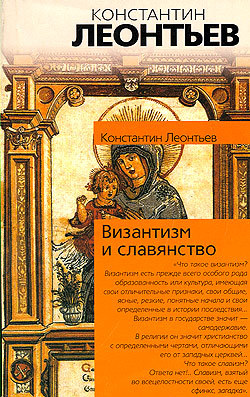SAINTS, MYSTICS AND VILLAINS OF PETERSBURG
MYSTICAL PETERSBURG
MYSTICS OF PETERSBURG
Byzantism and Slavdom

The outlook of Leontiev represents very original combination of an aestheticism, naturalism and religious metaphysics. Very close adjoining Slavophiles, being direct follower of Nikolay Danilevsky, Leontiev at the same time, in some questions, considerably deviated them (especially it has affected in political problems). The philosopher not only wasn't an orthodoxal Slavophile, but also declared triviality of tribal links in itself. In Russia he didn't see purely slavic country at all.
"Unconscious appointment of Russia was not and will not be purely slavic", - the thinker marked very often.
Aesthetic and religious pushing away from modern Europe with its levelling tendencies, with its renunciation of the own great past, - all was developed by Leontiev to the unique and consecutive outlook.
He was attracted only with beauty and force, and he escaped from Europe to the world where believed that else probably original development and flowering, e.g. China and Japan.
At the same time Leontiev urges to keep an integrity and force of Russian spirit that "to turn this force when will strike clear everything, terrible and great hour on service to the best and noblest principles of the European life, on service of this most to great old Europe by which we are obliged much and to which we (Russians) should pay good ".
According to the own understanding of law of historical development, Leonteiv meaningly struggled with ideas of democracy and liberalism.
His philosophy of history was summarised in work "Byzantizm and Slavic people". This concept the thinker named organic, and about a method he told as about transferring of idea of development from "the exact sciences ... into the historical area".
The philosophical treatise "Byzantizm and Slavic people" - the most well-known work of Leontiev. During the lifetime of Konstantin Nikolaevich it was published three times: in 1875 and then in 1876 and 1885.
The thinker gave to this work very much great value and expected that this treatise will glorify him. However during lifetime of the philosopher this dream has not come true.
Really "have noticed" and have estimated it only at the height of the Silver age (beginning of XX century). The principal social position he defines as "philosophical hatred to forms and spirit of the newest European life".
"For appearance of blossoming complexity are equally pernicious both the socialism, and capitalism for one frankly proclaims a social equality, conducts another to same requirements, tastes, cultural standards. Communistic equality of slaves and bourgeois slipping in a mass culture is the mixing simplification testifying to decomposition, rotting, ageing of the organic whole".
The philosopher felt thunder-storm approach over Russia. The age of Russia he, as well as subsequently Lev Gumilev, estimated from Kulikovsky Fight, from the year of unifying mission of Saint Sergy Radonezhsky.
But for comprehension of outlook of the philosopher his article "Literacy and a nationality", written in 1869 and published in "Dawn" in 1870 year is especially useful.
In it he specifies how destructive influence can render mass-education (even in the elementary forms) on the cultural-historical foundations which keeper are the common people.
Leontev connected one of ways of rescue of Russia with capture of Constantinople.
"Mad dreams" have been interfaced to this city of that part of Russian society which saw Russia the successor of Byzantium treasured.
Similar messianic moods were perfectly well reflected by famous Russian Feodor Tyutchev in a poem with the symbolical name "Russian geography".
Capture of Constantinople should be the key moment for realisation of the project of Leontiev.
During working out of concrete plans, situations and concrete results of the future war for Tsargrad (Constantinople) Leontiev also analyzed the numerous problems anyhow connected with elimination of threat from outside "cosmopolitan rationalism" and with conditions of realisation slavic ideals.
Russia, as Leontev considered, yet has not reached the period of a cultural dawn. Therefore influence of the western levelling ideas can be for Russia as a deadly poison which will ruin it before the country will manage to find itself. He marks: "Personal freedom has led the person only to a bigger irresponsibility", and rumours about equality and general well-being is "a giant thickness of all and all pounding in one mortar of pseudo-humane platitude".
Source:
KONSTANTINE LEONTIEV: PHILOSOPHER, AESTHETE, GEOPOLITICIAN AND MONK